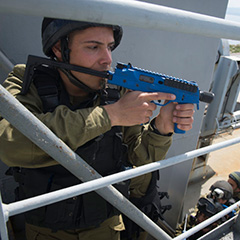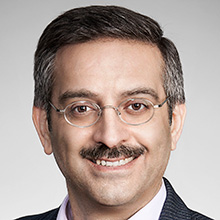
Why is Lavrov Pushing for a Karabakh Agreement?  By Benyamin Poghosyan, PhD, Chairman, Center for Political and Economic Strategic Studies
By Benyamin Poghosyan, PhD, Chairman, Center for Political and Economic Strategic Studies
As the world mobilizes to combat the COVID - 19 it sometimes appears that the pandemic has stopped geopolitics. Many urgent topics of international relations have been put aside. However, sooner or later the world will return to normality, and the old problems will re-emerge. Coronavirus has not decreased US - China rivalry, to the contrary the Post COVID-19 world will likely be characterized by a growing confrontation between China and the US. Among the problems waiting their turn to re-emerge in the geopolitical landscape in the post-Soviet space is the Nagorno Karabakh conflict. READ MORE
- EGF Editor |
Published on EGF: 30.04.2020
| Security
-
Military Cooperation between Israel, Greece and Cyprus  By Eugene Kogan, Tbilisi-based defence and security expert
By Eugene Kogan, Tbilisi-based defence and security expert
The trilateral military cooperation, begun in November 2017, has all the necessary components to become decisive for the three countries in the eastern Mediterranean in the long-term. In addition, the US is fully behind the three countries, sending a clear signal to Ankara not to provoke conflict in the region.
Turkey, which is still a member of NATO, is not in a position to prevent Israel from cooperating with NATO, although such cooperation is a thorn in the side of Turkey. Although Cypriot military exercises with Israel upset Turkey, it cannot prevent the two countries from cooperating. That is why we see a new military architecture in the Eastern Mediterranean, which will shape the security relations of the three countries in the coming years. READ MORE
- EGF Editor |
Published on EGF: 26.03.2020
| Security
-
What Next in Idlib?  By Benyamin Poghosyan, PhD, Chairman, Center for Political and Economic Strategic Studies
By Benyamin Poghosyan, PhD, Chairman, Center for Political and Economic Strategic Studies
In recent weeks the Syrian province of Idlib has been transformed into the hot spot of the Middle East. There were frantic flows of calls, meetings and visits between Russian, Turkish and Western officials. Some were seeking to deescalate the situation and prevent direct confrontation between Russian and Turkish troops, others were trying to use this situation and drive a wedge between Moscow and Ankara. Everything is pretty much clear – Turkey wants to keep Idlib under its control and use it as a tool to secure its influence in post–war Syria, while Russia is interested to finish the active phase of military operations and speed up the political process. READ MORE
- EGF Editor |
Published on EGF: 25.02.2020
| Security
-
President Trump’s Middle East Peace Plan: Possible Implications for Armenia  By Benyamin Poghosyan, PhD, Chairman, Center for Political and Economic Strategic Studies
By Benyamin Poghosyan, PhD, Chairman, Center for Political and Economic Strategic Studies
On January 28, 2020 President Trump unveiled his much long waited peace plan for the Israeli – Palestinian conflict. The plan was warmly welcomed by the Israeli Prime Minister Benyamin Netanyahu and Israeli opposition leader General Gantz. Simultaneously, it was sharply criticized by the Palestinian leader Mahmoud Abbas, who told that it belonged to the dustbin of history, and by Hamas leaders who stated that Palestinians would confront that deal. Turkish President Erdogan called it a plan to ignore the rights of Palestinians and legitimize Israel’s occupation. READ MORE
Opinion on Geostrategic Implications of BREXIT  By Benyamin Poghosyan, PhD, Chairman, Center for Political and Economic Strategic Studies
By Benyamin Poghosyan, PhD, Chairman, Center for Political and Economic Strategic Studies
The United Kingdom (UK) is leaving the European Union (EU) on January 31, 2020. This move will not only have tremendous geostrategic implications for the UK and EU but possibly may influence the transformation of the Post-Cold War order. First of all, for the first time in at least the recent 400 hundred years, the UK is abandoning its status of the "first-tier country" and most probably, will never return to the elite club. Without the UK, the struggle between continental Europe and the Ocean powers (US and UK), may reemerge again. READ MORE
- EGF Editor |
Published on EGF: 03.02.2020
| Security
-
How the EU Could Help Re-energize Peace Processes in the Eastern Partnership  By Elkhan Nuriyev, Humboldt Senior Fellow, Centre for East European and International Studies
By Elkhan Nuriyev, Humboldt Senior Fellow, Centre for East European and International Studies
Almost three decades on from the fall of communism, the European Union’s Eastern neighborhood remains embroiled in protracted conflicts that have hampered regional integration, bred mistrust, and encouraged wasteful military spending. This is mainly because the leaders of the Eastern Partnership countries—Armenia, Azerbaijan, Belarus, Georgia, Moldova, and Ukraine—lack flexible reconciliation strategies that may help build peace and foster political stability and economic prosperity.
Complex lingering conflicts have made the European Union’s Eastern partners the objects of a damaging geopolitical tussle between Russia and the EU.
READ MORE
- EGF Editor |
Published on EGF: 03.02.2020
| Security
-
Madrid Principles and Elements Need New Update  By Benyamin Poghosyan, Chairman, Center for Political and Economic Strategic Studies, Yerevan
By Benyamin Poghosyan, Chairman, Center for Political and Economic Strategic Studies, Yerevan
Since the start of the negotiations for the peaceful settlement of the Karabakh conflict all options suggested by the mediators have envisaged the return of some territories under the control of Nagorno-Karabakh to Azerbaijan. Meanwhile, till now, Armenia and Nagorno-Karabakh have managed to avoid such a scenario. However, this didn’t always happen for reasons under Armenian leaders’ control. READ MORE
- EGF Editor |
Published on EGF: 24.12.2019
| Security
-
Armenia and Azerbaijan: What’s Next After Bratislava?  By Benyamin Poghosyan, PhD, Executive Director, Political Science Association of Armenia
By Benyamin Poghosyan, PhD, Executive Director, Political Science Association of Armenia
On December 4, 2019, Armenian and Azerbaijani foreign ministers held their last meeting for this year on the margins of the OSCE Ministerial Conference in Bratislava. According to Armenian and Azerbaijani sources, the current stage of negotiations, the necessity of ceasefire consolidation and the implementation of confidence-building measures were among the key topics of discussion. The Foreign Minister of Armenia highlighted the modest achievement reached within the framework of the agreement on preparing the populations for peace, through the implementation of an exchange program for media representatives from Armenia, Artsakh and Azerbaijan. READ MORE
- EGF Editor |
Published on EGF: 10.12.2019
| Security
-
Turkey-NATO Relations: Strained and Constrained By Eugene Kogan, Tbilisi-based defence and security expert
Turkey-NATO relations have a history of challenges more or less since Turkey’s accession to NATO in 1952. Strained relations between Turkey and NATO have begun long before Turkey’s alleged failed coup attempt on 15 July 2016. However, the failed coup attempt increased tensions further and it is fair to assume that these tense relations are likely to continue. At the same time, Turkey-NATO relations are constrained by a not yet amended North Atlantic Treaty of 4 April 1949. As long as the treaty remains not updated very little can be done to change the nature of Turkey-NATO relations. READ MORE.
- EGF Editor |
Published on EGF: 20.11.2019
| Security
-
Turkey’s Incursion into Syria: What Lessons Should Armenia Take?  By Benyamin Poghosyan, PhD, Executive Director, Political Science Association of Armenia
By Benyamin Poghosyan, PhD, Executive Director, Political Science Association of Armenia
The eight and half years of Syrian conflict saw various, sometimes very strange, ups and downs. Everything started as an uprising against the authoritarian state with demands for democratic reforms. Later the situation transformed into civil war with growing influence of foreign fighters. In 2014, the Islamic State entered the stage making President Assad less evil for the West. Then Russia intervened militarily and changed the course of the war effectively saving Assad. In 2016 and 2018 Turkey launched two military operations taking under control parts of North-Western Syria. READ MORE
- EGF Editor |
Published on EGF: 28.10.2019
| Security
-
